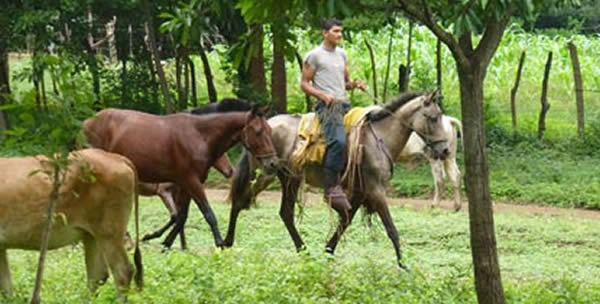
And photographs, if you have any.
Horseytalk.net Special Interview
Freya Dowson
Nicaragua Part 1
"The love that these people have for their horses is immediately apparent, in some cases horses are referred to as family members"

Says Freya Dowson, Digital content and community officer, The Brooke
It has now been two days since I landed in Nicaragua with a Brooke scoping team and I can safely say that the state of the horses here is not at all what I was expecting.
The love that these people have for their horses is immediately apparent, in some cases horses are referred to as family members. .
Not everyone has the same level of dedication to their animals, but at the very least the people of Nicaragua respect their horses and recognise the vital contribution that they make to their lives.
When I found out that I was going to be working in Nicaragua, I was a little nervous.
I’ve had a dedicated love of horses since before I could walk, and occasionally travelling oversees and seeing them in sometimes difficult circumstances can be painful.
However even though Nicaragua has no equine specific support system (yet), so far I have only seen that the owners do the best they can to care for their horses with what they have – which often isn’t much.
That’s not to say that serious equine welfare concerns don’t exist. As in most developing countries, many of the horses are thin and have apathetic or highly anxious temperaments.
We are also seeing some alarming yet confusing medical issues, for example several mares in one area seem to be aborting their foetuses for no immediately apparent reason.
As in other countries, we are also seeing that home-made remedies and treatments based on traditional knowledge are taking the place of proper veterinary treatment.
Light kerosene is used to cure thrush on a hoof and bleach and women’s urine used to cure other hoof ailments. There is sometimes a complete lack of pain medication when performing relatively serious procedures such as gelding stallions – I’ll spare you the details.
As misguided as some of these practices are, the fact remains that these horse owners do what they do because they believe they are helping their animals.
And it doesn’t seem too difficult to believe that if explained properly, these owners would be
happy to adopt best practice according to the Brooke’s welfare guidelines.
I believe they would be eager in fact to do anything that would help their horses. Speaking to the owners here quickly reveals a thirst for knowledge.
They are not interested in handouts and having things done for them. They want to be taught and given the tools to be self-sufficient.
I’m here with a scoping team consisting of programmatic staff looking at setting up a pilot project, a welfare team doing assessments on working equines, and a vet looking into the level of local service providers such as paravets, feed sellers and farriers
If the Brooke decides to move forward with its plan to work in Nicaragua, I believe a great deal of good could be achieved.
Interview sourced from Freya Dowson (Digital content and community officer) The Brooke



